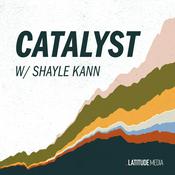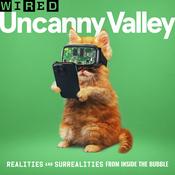27 episodes
- Bienvenides a Nyéléni: Una oportunidad para cambiarlo todo, un podcast que nos sumerge en el mundo de la soberanía alimentaria a través de las voces y experiencias de quienes construyen este movimiento global.
En este tercer episodio, “Educación para la transformación”, Margarita y su organización debaten a fondo cuál será el tema principal que llevarán al III Foro Global Nyéléni 2025 en Sri Lanka. Entre opciones como la soberanía alimentaria, las tecnologías digitales, la economía criminal y otros desafíos, finalmente acuerdan que la educación, ligada a sus realidades y luchas territoriales, será el eje de su aporte al encuentro.
La conversación se enriquece con la entrevista a Fabián Pachón, coordinador académico del Instituto Agroecológico IALA María Cano, quien comparte su experiencia sobre educación popular y agroecología. A partir de allí, Margarita reflexiona sobre cómo este tema se conecta con las agendas globales de justicia social, ambiental y de género.
El episodio acompaña también los últimos pasos de su preparación para el viaje: organizar papeles, armar la valija, despedirse de la comunidad. Con el sonido de un avión de fondo, se abre un nuevo capítulo en su activismo, marcando la unión entre lo local y lo global.
Créditos:
Producción, guión y edición: Luciana Chiodi
Locución: Cata Chaves - Bienvenides a Nyéléni: Una oportunidad para cambiarlo todo, un podcast que nos sumerge en el mundo de la soberanía alimentaria a través de las voces y experiencias de quienes construyen este movimiento global.
En este segundo episodio, “Los debates que vienen”, Margarita avanza en los preparativos para viajar al III Foro Global Nyéléni 2025 en Sri Lanka. Mientras organiza su participación, se adentra en las discusiones clave que marcarán el foro: soberanía alimentaria, agroecología, justicia climática, feminismo, economía social y solidaria, datos y tecnologías, y la construcción de alianzas globales.
A través de reuniones virtuales, revisión de documentos y conversaciones con compañeras, descubre las tensiones entre los debates globales y las realidades locales, reflexionando sobre la criminalización de defensores del territorio, el papel de las mujeres en la transformación sistémica y la agroecología campesina como alternativa frente a la crisis alimentaria.
Este episodio nos muestra la complejidad de preparar un foro internacional y cómo las luchas locales se conectan con los debates globales, recordándonos que cada voz cuenta en la construcción de un sistema alimentario más justo y sostenible.
Créditos:
Producción, guión y edición: Luciana Chiodi
Locución: Cata Chaves - Bienvenides a Nyéléni: Una oportunidad para cambiarlo todo, un podcast que nos sumerge en el mundo de la soberanía alimentaria a través de las voces y experiencias de quienes construyen este movimiento global.
Inspirado en la figura de Nyéléni, una campesina maliense que se volvió símbolo de resistencia y dignidad, el foro convoca a movimientos sociales y organizaciones de todo el mundo que luchan por la soberanía alimentaria, la justicia social y una transformación profunda de los sistemas que sostienen nuestras vidas.
En este primer episodio, “Donde todo comienza”, acompañamos a Margarita, activista de una organización de mujeres en Latinoamérica, mientras se prepara para asistir al III Foro Global Nyéléni 2025, que se realizará en septiembre en Sri Lanka.
Para comprender el contexto del foro, decide investigar la historia y el significado del movimiento Nyéléni. En su búsqueda, entrevista a Soledad Vogliano, integrante del Grupo ETC y participante de los foros desde el primer encuentro en Malí en 2007. Juntas recorren la historia del movimiento, el simbolismo de Nyéléni, los foros anteriores y la evolución del concepto de soberanía alimentaria.
El episodio explora la importancia de la agroecología, la justicia social, el feminismo y la interseccionalidad en el movimiento, y muestra cómo nuestra protagonista comparte lo aprendido con sus compañeras, generando un debate sobre la relevancia del movimiento en su contexto local.
A través de esta narrativa, Nyéléni: Una oportunidad para cambiarlo todo nos invita a conocer los valores y la historia de un movimiento que conecta luchas locales y globales por la alimentación digna, justa y sostenible.
Créditos:
Producción, guión y edición: Luciana Chiodi
Locución: Cata Chaves - En este tercer y último episodio de "Soberanía alimentaria para un mundo en crisis", reflexionamos acerca de cómo prepararnos para las crisis climáticas que se avecinan. A través de testimonios desde Ecuador, México y Brasil, conocemos experiencias inspiradoras que demuestran que la agroecología es una respuesta real para crear un futuro sostenible. En un mundo cada vez más urbanizado, es clave la articulación entre el campo y la ciudad. Un movimiento a largo plazo por la alimentación puede armar ese puente tan urgente y necesario entre estos territorios. La soberanía alimentaria no es un sueño lejano, sino un camino que se construye paso a paso, sembrando soluciones para cosechar futuro.
Podcast: Soberanía alimentaria para un mundo en crisis
La crisis climática y el modelo agroindustrial ponen en riesgo nuestra comida. Pero hay soluciones reales impulsadas por los movimientos campesinos y la sociedad civil. En este podcast, exploramos las amenazas al sistema alimentario y las alternativas que ya están construyendo un futuro más justo y sostenible.
Créditos:
Producción, guión y edición: Luciana Chiodi
Locución: Leonora Espinosa - En este segundo episodio exploramos las redes de resistencia que están transformando nuestro sistema alimentario desde los territorios. Conocemos historias de quienes protegen las semillas ancestrales y los conocimientos tradicionales, especialmente las mujeres que han sido las guardianas históricas de la diversidad genética, frente a un modelo agroindustrial que ha destruido el 75% de la diversidad agrícola mundial. También nos adentramos en el proceso Nyéléni, el movimiento global que desde 2007 reúne a campesinos, indígenas, mujeres y otros actores para construir alternativas al sistema alimentario actual. Un llamado a la acción colectiva por el derecho a una alimentación sana y el cuidado del planeta.
Podcast: Soberanía alimentaria para un mundo en crisis
La crisis climática y el modelo agroindustrial ponen en riesgo nuestra comida. Pero hay soluciones reales impulsadas por los movimientos campesinos y la sociedad civil. En este podcast, exploramos las amenazas al sistema alimentario y las alternativas que ya están construyendo un futuro más justo y sostenible.
Créditos:
Producción, guión y edición: Luciana Chiodi
Locución: Leonora Espinosa
More Technology podcasts
Trending Technology podcasts
About ETC Group podcasts
ETC Group is a small, international, research and action collective committed to social and environmental justice, human rights and the defence of just and ecological agri-food systems and the web of life. We focus on understanding and challenging corporate-controlled techno-industrial systems and exposing the dangers of the technological manipulation of life, especially in relation to climate justice and food security. We uphold peasant and indigenous ways of life and knowledge systems; food sovereignty; people’s control of technology; and just economies and governance.
Podcast websiteListen to ETC Group podcasts, Darknet Diaries and many other podcasts from around the world with the radio.net app

Get the free radio.net app
- Stations and podcasts to bookmark
- Stream via Wi-Fi or Bluetooth
- Supports Carplay & Android Auto
- Many other app features
Get the free radio.net app
- Stations and podcasts to bookmark
- Stream via Wi-Fi or Bluetooth
- Supports Carplay & Android Auto
- Many other app features


ETC Group podcasts
Scan code,
download the app,
start listening.
download the app,
start listening.






































